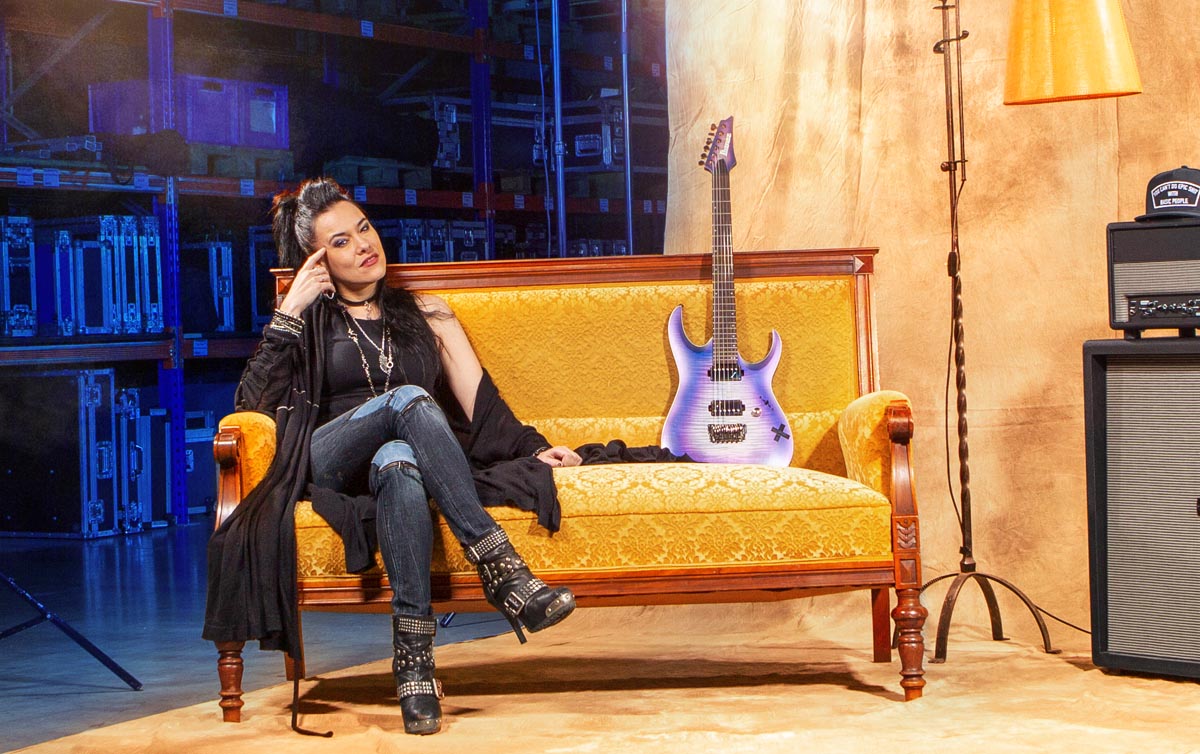Evanescence’s Jen Majura: 5 tips for guitar players – “What you need is taste, phrasing, tone, the ability to hear and the ability to shut up sometimes”
Majura shares the perils of neoclassical AC/DC covers and advice on how to keep your guitar journey musical

Switch your phone off. Delete social media. Or at the very least, deactivate it for a while. Take a walk and reconnect with nature. Taking a moment to live can come in handy the next time you have an electric guitar in hand.
Jen Majura is a big advocate of this approach – of patience, clearing a little space for inspiration to take hold, and as the Evanescence guitarist joins MusicRadar from her home in Germany, she is sharing a little a little wisdom ahead of the release of the band's first album of all original material in a decade, The Bitter Truth.
She is also still on a buzz after performing Wasted On You – albeit remotely – on Jimmy Kimmel Live! “It was funny, because I put my my in-ears in, closed my eyes, and the moment the music kicks in you really feel like you are together with your bandmates again,” she says. “Until you open up your eyes and realise, ‘Oh, I am standing all by myself in a giant studio room! [Laughs]“
"I took a month off social media. I didn’t go on Facebook, Instagram, anything. It really slowed things down. It was like I put some really chewy chewing gum in that slowed my life down. It was amazing"
“But it is nice that, as an artist, you are still able to give the fans something and connect with them. It’s beautiful. And I really enjoyed that Jimmy Kimmel moment. I was like, ‘Wow! This is big.’”
In this year of weird isolation, the Kimmel show was a fun thing to do, but it also put a bow around The Bitter Truth's protracted release. Like most things in 2020, it gone done, but not in the way that anyone would have predicted beforehand.
Booked in with producer Nick Raskulinecz, the band had tracked around four tracks in Nashville before Majura flew home. The plan was to return and finish the record – until the pandemic stepped in and closed the planet.
“I had no idea that I was not going to travel back and see my friends before the end of the year,” she says. “Still, to this very day, I haven’t seen them! Which is odd and weird.”
Want all the hottest music and gear news, reviews, deals, features and more, direct to your inbox? Sign up here.
"When you learn to play the piano, you just hit the key and there’s a tone. It is completely different when it comes to the guitar. You have to work on getting a tone out of that instrument from the beginning"
Majura was left cooling her heels in Germany. When we spoke to guitarist Troy McLawhorn back in September, all the band could do was wait. But they released what they had gradually.
Using iPhones, they had shot videos for the The Game Is Over and Wasted On You. Use My Voice was used by the Headcount campaign to increase voter participation in the US presidential election.
Once Evanescence got back into action, Majura sent in her parts remotely. “They sent me the files and I was just sending my stuff recorded at my home in Germany back to Nashville for Nick to put into the mix.”

What has this whole experience taught her? Maybe the value of a month-long social media break. But also, boredom wasn’t quite as inspiring as she thought it might have been.
“What I learned was that, when it comes to inspiration, you have to have something in your life that inspires you,” she says. “My life for the past three years was just airplanes, hotels, venues, tour bus, jet lag. Sometimes I had two packed suitcases – one sitting waiting for me at home just in case I didn’t have time to do laundry when I came back from tour.
“I thought that 2020 would be amazing and I would have so much time to practise, but what I really learned was that you have to have a certain kind of input. When all of that hotel, travel, all of that which was your input, is replaced by your couch in the living room, this is not inspiring at all.
“What am I supposed to write about? The couch? [Laughs]. I thought this would be amazing, all this time to practise and write, and then, nothing. Nothing came out.”
1. Be patient with yourself
“When you learn to play the piano, you just hit the key and there’s a tone. It is completely different when it comes to the guitar. You have to work on getting a tone out of that instrument from the beginning, so I would say be patient with yourself. That’s the first thing.
“This tip about being patient with yourself is not just for guitar players – it is for life in general. We live in such a fast-speed life and people are just going faster, faster, faster. ‘I need to get this done! Faster!’ Be patient! It’s okay. Be patient and relax. [Laughs]
“In January, I took a month off social media. I didn’t go on Facebook, Instagram, anything like that. It really slowed things down. It was like I put some really chewy chewing gum in that slowed my life down. It was amazing. I took long walks and connected with nature. You have to recharge your batteries if you want to charge others. You can stop. You can do it. Relax.”

2. Be consistent – develop a practice routine
“Consistency of practising in a daily routine is very important, because you have to get used to your fingers and your hand movements. It doesn’t help when you practise for three hours the day before you go to your next guitar lesson. All that does is kill your fingertips.
I think it is very important that kids, or guitar students, people who are learning to play, are aware that it is routine that will make them improve and become better
“I think it is very important that kids, or guitar students, people who are learning to play, are aware that it is routine that will make them improve and become better. What other movement with your left hand are you doing on a daily basis that is similar to the movement you do on a guitar? Not a single thing. It is training your muscle memory in your fingers.
“It is the same thing as if you were to brush your teeth for three hours, one day a week – it doesn’t make your teeth healthy. That’s a really weird comparison. [Laughs] But it’s true. It’s true! Maybe at the beginning you don’t have the experience to know your practice schedule – you just have two chords for example. But do that for 10 minutes every day.”
3. Starting slowly is the quickest way to build speed
“You can play something faster once you are able to play it slow and correctly. I truly believe that I wasted probably two years of my life when I was a kid and wanted to learn to play the guitar – because of my expectations. ‘I wanna play this fast. I wanna play this fast.’
“But when you play things fast from the get-go, you hit this one part where you are like, ‘Ah shit, again! From the beginning.’ And again... You practise mistakes, because your muscle memory in your fingers will remember that mistake that you are practising.
You need that time for the brain to talk to your fingers because, if you go too fast, you will make the same mistake over and over and over again. It is then super hard to get rid of that mistake
“I would rather slow down and go really slow. Let your brain tell your fingers what to do. You need that time for the brain to talk to your fingers, because if you go too fast, you will make the same mistake over and over and over again. And of course, your fingers are going to say, ‘Well, we’ve played this 10 times so it must be right.’ It is then super hard to get rid of that mistake.
“When I first started playing guitar, the first VHS tape – back in the days before YouTube and all the white noise – was Richie Kotzen’s Rock Chops. Man, the only thing I could play was a C major chord and I looked at that VHS tape… It goes insanely fast! ‘What is this!? How is this possible?’
“Then, funnily enough, a couple of years ago we met. He said, ‘Hi, I’m Richie.’ I’m like, ‘Hi, I’m Jen, and you fucked up my playing when I was eight! [laughs] But it was so cool. We met, we became friends and had a good laugh about it.”

4. Switch up your practice exercises
“I don’t know why, but most of our guitar exercises, you put one finger on each fret – 5, 6, 7, 8 – and then go to the next string, 5, 6, 7, 8… Most of the guitar exercises start with your index finger. Just to get a little more rhythmically independent, I would suggest shifting the pulse around. Don’t start every exercise with your index finger.
Just to get a little more rhythmically independent, I would suggest shifting the pulse around. Don’t start every exercise with your index finger
“When it comes to being more rhythmically independent, challenge yourself by taking a four-note exercise and put it into a triplet feel. It will shift the pulse of the 1 again. So, if you play 1, 2, 3, 4… It is different if you play 1, TWO, 3, 4. You shift the one into triplets even though it is a four-tone exercise. That helped me a lot.
“If you practise that, you become freer, more independent in your rhythmic thinking, and that will show when you play solos. When you improvise, practising that independence of rhythmic feel helps a lot.
“I think for every musician, not only guitar players, the goal is to not think the music you want to play but to hear it and let your body and your mind play it. The goal is to practise so that, when you play, you don’t have to think.”
5. Find your style and make it your own
“There are guitar players who are awesome at everything. Guthrie Govan, I mean, you can throw any style at him and he is going to be better than the best in that category. It is just insane. But I think you have to find your thing and then focus on your thing instead of trying to be perfect at everything. Focus on you.
“For example, I suck when it comes to sweeping. Sweeping is something that I have never use. I played in an AC/DC tribute band, and I remember one show that we played and there was the big giant guitar solo in the middle of Let There Be Rock, and I was like, ‘Pentatonic, pentatonic, pentatonic… It’s okay.’ I thought, ‘Today, I’m going to do something awesome, neoclassical diminished minor something…’
“We played a Harley [Davidson] event. I’ll never forget this. I started off with the pentatonic stuff and went all the way up the neck and played some Yngwie Malmsteen stuff, and I finished, looked up, and the guys in the audience… Everyone was like, ‘What the hell!? What was that!’ As soon as I saw them, I thought, ‘Okay, I’m gonna go back to the pentatonic.’
“But I never had the desire to learn the sweeping techniques. I know the technique, but I just don’t ever practise it. Because that was like speed stuff, and I don’t think that you need speed to be a quality guitar player.
“What you need is taste, phrasing, tone, the ability to hear and understand, the ability to shut up sometimes, because most guitar players overplay. Leave gaps. Let the melody breathe. Those are the qualities that turn you into a good musician.
I've never sat down with my metronome in my basement and thought, ‘Today I am going to nail 151bpm, and tomorrow, 152bpm.' That is not musical. Music is about tone. It is not about speed.
“Play for the song. Play what the song demands. Don’t play for yourself, to show off. Also, I've never sat down with my metronome in my basement and thought, ‘Today I am going to nail 151bpm, and tomorrow, 152bpm.' That is not musical. Music is about tone. It is not about speed.
“I talked to Guthrie about that once and he said something really, really true. He said, ‘Why do people judge fast guitar players as better guitar players?’ People who don’t understand tone and taste can only judge by the amount of notes, which is the same as, like, if you were to watch a soccer game.
“Which team wins? The one with the most goals. If you watch car racing, which team wins? The one that’s the fastest. It is measurable. But feelings and emotions are not really measurable, so I think that is the reason why people judge fast guitar players as better, or more valuable than slow guitar players.”
- Evanescences' new album, The Bitter Truth, is out now via BMG.
Jonathan Horsley has been writing about guitars and guitar culture since 2005, playing them since 1990, and regularly contributes to MusicRadar, Total Guitar and Guitar World. He uses Jazz III nylon picks, 10s during the week, 9s at the weekend, and shamefully still struggles with rhythm figure one of Van Halen’s Panama.
